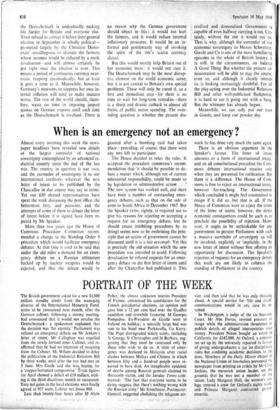When is an emergency not an emergency?
Almost every morning this week -the news- paper headlines have revealed new details of the largest surrender of national sovereignty contemplated by an advanced in- dustrial country since the end of the last war. The country in question is our own, and the surrender of sovereignty is to our international creditors—whatever the new letter of intent to be published by the Chancellor in due course may say in terms. Yet our 630 elected representatives have spent the week discussing the poseoffice, the betterment levy, and pensions, and the attempts of some of them to debate the letter of intent before it is signed have been re- jected by Mr Speaker.
More than two years ago the House of Commons Procedure Committee recom- mended a change in the Standing Order 9 procedure which would facilitate emergency debates. At that time it used to be said that under the old rules a demand for an emer- gency debate on a Russian ultimatum backed up by nuclear weapons would be rejected, and that the debate would be granted after a bombing raid had taken place—providing, of course, that there were any MPS left to participate.
The House decided to relax the rules. It accepted the procedure committee's recom- mendation that 'it should be possible to de- bate a matter Which, although not of current ministerial responsibility, could be made so by legislation or administrative action . . The new system has worked well, and there have been a number of outstanding emer- gency debates, such as that on the sale of arms to South Africa in December 1967. But the Speaker (who, rightly, is required not to give his reasons for rejecting or accepting a request for an emergency debate, lest he should create inhibiting precedents by so doing) seems now to be enshrining the prin- ciple that an action of government cannot be discussed until it is a fait accompli. Yet this is precisely the old situation which the new procedure was intended to avoid. Following devaluation he refused requests for an emer- gency debate on the first letter of intent until after the Chancellor had published it. This week he has done very much the same again.
There is an obvious argument in the Speaker's favour. The letter of intent amounts to a form of international treaty, and on all constitutional precedent the Com- mons debates international treaties only when they are presented for ratification. But there is- a difference. The House of Com- mons is free to reject an international treaty, however far-reaching. The Government which concluded it might feel constrained to resign if it did so, but that is all. If the House of Commons were to reject the terms of the letter of intent, however, the direct economic consequences could be such as to preclude the possibility of rejection. More- over, it ought to be unthinkable for any government to present Parliament with such a massive surrender of sovereignty as will be-involved, explicitly or implicitly, in the new letter of intent without first offering an opportunity for discussion. The Speaker's rejection of requests for an emergency debate this week are not likely to enhance the standing of Parliament in the country.






































 Previous page
Previous page